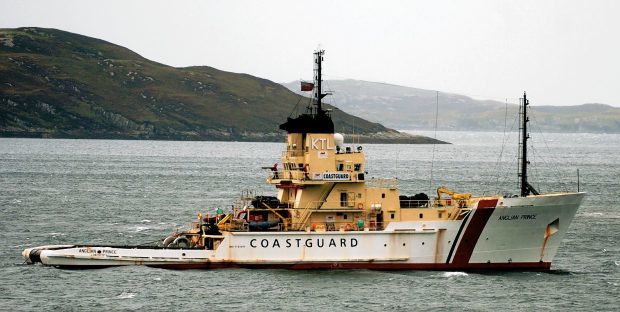A leading campaigner claims an “environmental coastal catastrophe” is looming because of Scotland’s dependence on a single emergency tug.
Former Highland Council leader and serving board member of the Scottish Fire and Rescue Service Michael Foxley has made a plea to the UK Government to reinstate a second Scottish tug amid widespread fears that the north will have no such vessel after September.
The retired GP has warned that it was simply a matter of time before the north of Scotland suffered a major coastal incident.
“Hopefully it will not involve loss of life,” he said.
“But it will have catastrophic implications for the economy and the environment of the west coast.”
Until 2011, the UK had four emergency towing vessels (ETVs), one each stationed in and around the northern isles, the Western Isles, on the Cornish coast and in the Dover Strait.
Financial cuts left the one vessel – Herakles – in and around Orkney covering both the northern and Western Isles.
The decision was part of the comprehensive spending review package announced in October 2010, based on the UK Government’s judgment about “the balance of risk of pollution in the event of a maritime accident”.
The Maritime and Coastguard Agency (MCA) recently secured funding to extend the current ETV contract for the single Orkney vessel. But the cover is due to expire on September 30.
It is consulting with stakeholders in Scotland while exploring “alternative options” which might allow the maintenance of an ETV capability without the use of public funds.
Dr Foxley said: “The Orkney tug is not remotely doing the job it used to do. When there were two tugs, the one in Stornoway was fully manned and out in The Minches, so it would shadow hazardous cargoes such as nuclear shipments.
“If there was anything the coastguard was concerned about it would react to it.
“Under the current set-up, the crew take time to mobilise. It’s no longer ‘rapid response’. It’s a long way from Ardnamurchan or Barra when the vessel is in Orkney.
“The waters of The Minches and the Pentland Firth are some of the most hazardous in the UK. There have been at least six incidents in the last five or six years in The Minches.”
A spokeswoman for the MCA insisted that maritime safety was a priority.
She said: “We’ve recently secured funding to extend the current ETV contract for one ETV and this coverage will now expire on September 30.”
She added that any changes in shipping patterns would be reviewed during the consultation and taken into consideration.
A senior UK Government source has told the Press and Journal that the contract will be renewed in September.
ETVs were deployed in the wake of the 1993 oil tanker disaster in which the Liberian-registered MV Braer ran aground in a hurricane, spilling its load off Shetland.
Highland Council is maintaining pressure on the UK and Scottish governments to secure long-term funding for tugs to cover the north and west coastline.
